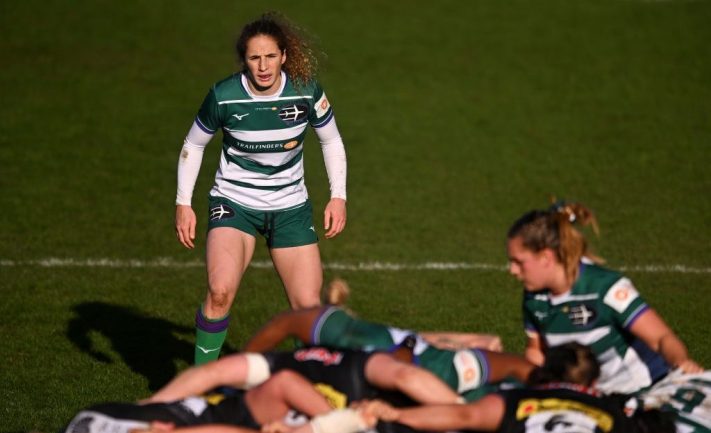As usual, the summer break has seen many players switching clubs.
There is nothing unusual about that, but this year brings its own quota of interesting issues.
Today, 30 June sees the two latest signings for Trailfinders, Isla Duncan-Bell and Celia Quansah. Duncan-Bell becomes the second GB 7s regular to move to the 15s game, following a parallel move by Ellie Boatman. Quansah, once of Wasps, is an ex-England 7s player.
It leaves undecided the intentions of the rest of the GB squad about their future. If they do resolve to stick with the short-format game, they know they will be competing on a very unlevel playing-field. The three national unions refuse to go on funding the enterprise full-time.
Back to the signings. Duncan-Bell becomes one of a forest of new faces at Vallis Way. In recent months I have spotted the names: Alana Borland (née Bremner), Cana Willims, Claire Gallagher, Emma Wassell, Francesca McGhie, Haidee Head, Manon Johnes, Meg Jones, Niamh Swailes and Rachel Malcolm.
Of those thirteen precisely five are eligible to play for England (EQPs). How does the PWR board react to that? They may say – as they did with the arrival of Ilona Maher – ‘Great! That adds enormously to our pulling power. Or they may recall one of the fundamentals of the newly formed league three years ago, to offer full support to the Red Roses.
Every overseas player coming to the PWR is likely to return home a better player, however distinguished her career before her arrival. Her position on a team-list prevents a local player from making her bid.
The Trailfinders squad is now littered with players representing Australia, Belgium, Canada, Ireland, Scotland, New Zealand and Wales. The club has had a long-standing link with Brunel University, not far away in Uxbridge. They have now signed a ten-year deal ensuring an even more profitable association.
A few players, like Annabel Meta, have trodden that path towards the elite XV, but she for one has found it hard keeping her place. When she’s competing against the likes of Kate Zackary (USA captain), Rachel Malcolm (Scotland captain) and Abi Burton (England!) in the back-row, she knows she’s up against it. And the pattern is repeated across most of the other eight clubs. Is the club looking forward to the day when it no longer needs to respond to request from overseas players for a trial? In my view that day might as well be in the next millennium.
The PWR’s attitude becomes more and more critical. Where will they set the bar? One day the Red Roses may not be the hot favourites to take the RWC trophy. They may even find their club places being taken by overseas imports. If two Black Ferns (Amy Rule, Alana Borland) think it profitable to join in, who next?
The GB Sevens Enigma
Back to the 7s problem.
From the very start the notion of a GB Sevens squad was hampered by regulations. The Olympic Committee had its own ideas about who could and should be be admitted to the men’s and women’s sides. Ireland was the cross-roads. The term “GB and Northern Ireland” was unacceptable to the IOC, not least because the IRFU said it would would compel Ulster players to play for Ireland in any Olympic tournament.
England (and the RFU) have been the leading figures in the business from the start, which hampers the development of Scottish and Welsh players. And it was the RFU that suddenly terminated its 7s contracts, putting the skids under the whole operation.
Boatman and Duncan-Bell are the first two players from the current GB squad to appear to say good-bye to the enterprise. How many more will follow? It’s not as if they all sat down together and decided to follow the one path or the other – quit or stay.
Of the remainder there are several who have already served time in the PWR with distinction, even gaining a place in Red Roses teams (eg Abbie Brown and Amy Wilson Hardy, up to decade ago, and Heather Cowell). One big plus is that they are mostly England qualified, so PWR clubs could hold out a welcoming hand without having to worry about contravening standing regulations.
A final incoherence, or a repeat bleat
I return to a point I’ve made before.
When players move clubs, they speak only of their pleasure in what faces them, not of their reasons for quitting their former club. In TF’s case they all praise the welcoming aura and the structures in place. That means in part, the coaching style of Barney Maddison.
But he was brought into position by the Director of Rugby, Ben Ward. It is he who has overseen the dismissal of Giselle Mather as DoR and the departure of Abby Dow (the first name on that mythical England team-sheet?), both allegedly for differences of philosophy. Ward says he wants his teams to play the “Ealing” way. It’s hard to discern what he means by that; presumably a fast, open game. But that is precisely the style that characterised Mather’s reigns at Wasps and TF. As for Dow, what other style of rugby could she possibly prefer?









